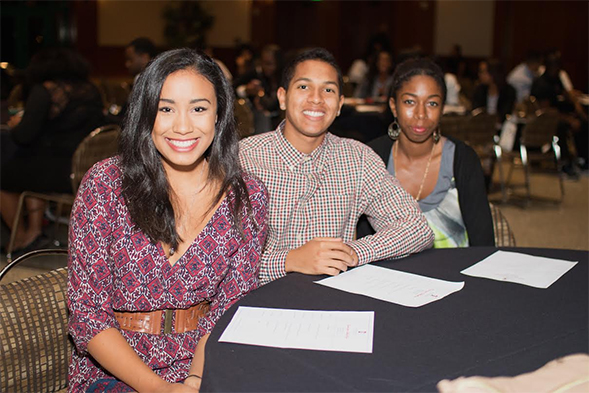An Authentic Experience
Harambee and Howka Weekend gives admitted African American and American Indian students a preview of the Aztec Experience on March 18.

This year marks the third year Harambee Scholar mentor Kevin Archangel will share his Aztec Experience with admitted students at Harambee Weekend, and it certainly won’t be the last.
“When it comes to San Diego State University, I share my personal story with the students,” said Archangel, a junior majoring in electrical engineering. “I tell them the realness of what it’s like to be at SDSU, and I tell them that, ‘SDSU provides you with the ability to become something that you never thought you would become.’”
Each spring, SDSU invites admitted African American and American Indian students and their families to Harambee and Howka Weekend, which will take place March 18 through 19. The programs introduce prospective students to the cultural experiences at SDSU and encourage participation in Explore SDSU which is held the same weekend.
Both Harambee Weekend and Howka Weekend work in tandem with the Aztec Scholars Initiative, a university-wide effort to bring more underrepresented students to campus and offer them support as they transition to college life until graduation.
Aztec Scholars Retention Coordinator Jamaul Simmons said the goal is to inspire more minority students to see themselves as thriving college students at SDSU.
“The more diverse viewpoints and experiences we can bring to SDSU contributes to a better SDSU community,” Simmons said. “There are more opportunities for students to meet people outside of their cultural background and develop relationships, learn more about other cultures, and that’s when we start to see transformative experiences and our students becoming better students.”
Introducing Howka Weekend
For the first time, the Elymash Yuuchaap Indigenous Leaders and Scholars Program will host prospective American Indian students overnight at Howka Weekend. It will also be the first time chemistry major Jade Johnson, a first-generation Navajo student, will share her experience as a second-year mentor in the program.
“As a Native student myself, I feel really happy that I am here because the Native American community on campus is very tight and interwoven,” Johnson said. “If you’re curious about your own cultural identity and want to know more about it, there are definitely a lot of opportunities to help you grow while you’re here.”
Through Elymash Yuuchaap — offered through the university’s American Indian Studies Department — Johnson was connected with campus resources to support her academic success and to research opportunities like Maximizing Access to Research Careers (MARC), an eight-week research program funded by the National Institutes of Health.
“For me as a science major, I’ve received a lot of support being a Native American in STEM through the different connections I’ve made,” Johnson said.
Growing diverse student leaders
Once enrolled, students who participate in the Harambee Mentoring and Elymash Yuuchaap programs often become more engaged in student life on campus.
In addition to her mentor role, Johnson leads the Native American Student Alliance on campus as its president. Archangel is the president of the fraternity Phi Beta Sigma and is actively involved in the Student African American Brotherhood and National Society of Black Engineers.
“Through Harambee, I learned about the different organizations that pertain to my identity and the different individuals involved with my major,” Archangel said. “As a mentee, I looked up to the mentors, and they taught me how to value what’s around you. There is a genuine relationship we have toward each other to succeed.”
Simmons said the Aztec Scholars Initiative aims to create a system where first-year students are inspired to become mentors as upper-division students and feed their knowledge back into their student communities.
“Our students take on more leadership roles and make a lot of contributions to Associated Students, Residential Life and student organizations through Student Life and Leadership,” Simmons said. “They do bring a lot of really great experience and different pieces of the puzzle that every institution needs.”



